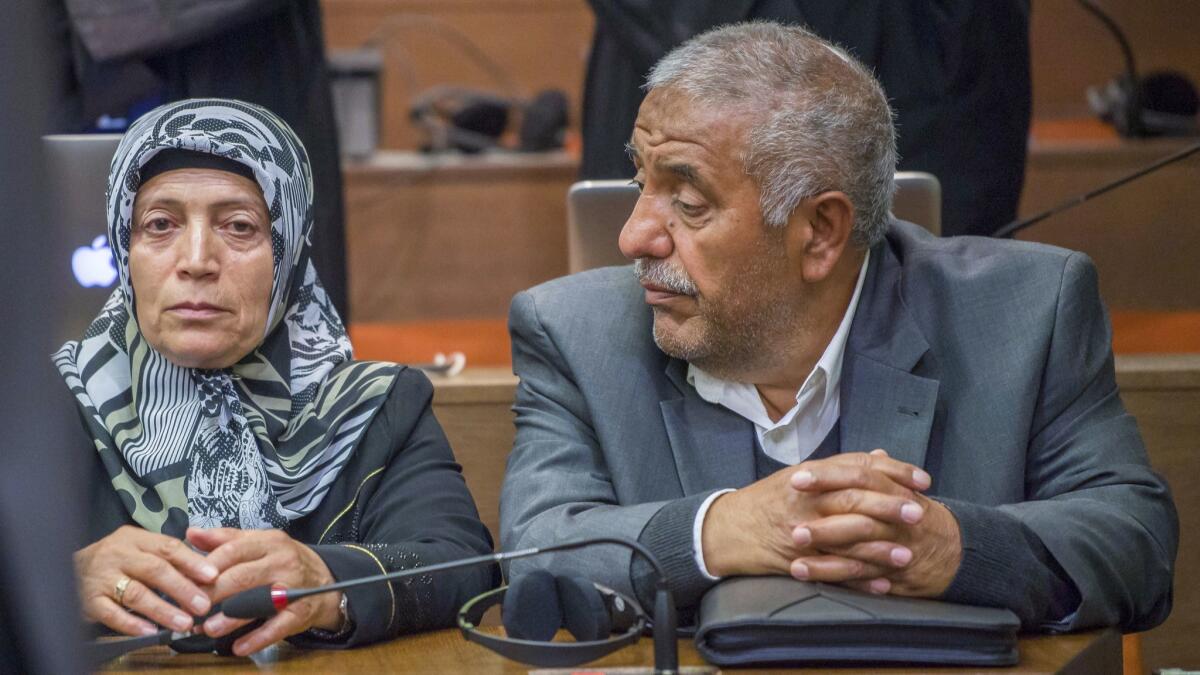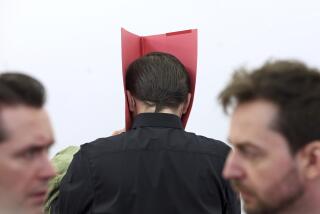German Neo-Nazi found guilty of murder in execution-style slayings of migrants

Reporting from Berlin — The assailants surprised their victims, regular people going about their daily business, bursting into their lives and shooting them in the head at close range.
The 10 people killed between 2000 and 2007 were selected largely at random by members of a neo-Nazi group because they were thought to be foreigners, a German judge said Wednesday, and the attackers did not bother trying to disguise themselves.
“The utter surprise is exactly what the assailants wanted,” Judge Manfred Goetzl told a Munich courtroom.
Goetzl’s comments came as a key defendant in the killings, Beate Zschaepe, was found guilty of 10 counts of murder and sentenced to life in prison after a five-year trial for the killing spree of mostly migrants that shook much of Germany and tarnished the country’s reputation.
Some spectators in the packed courtroom loudly applauded when Goetzl read the verdict.
Zschaepe, 43, played a leading role in the slayings, authorities said, and was part of an underground neo-Nazi group calling itself the National Socialist Underground, or NSU, that police failed to detect until after two of its leaders killed themselves in 2011 as police discovered the ring by chance. Zschaepe denied any knowledge of the slayings during her trial but told the court she regretted not stopping the two male leaders of the gang.
Eight Turks, a Greek and a German policewoman were shot to death by the NSU. Many were shopkeepers or working at Turkish fast-food restaurants when they were gunned down by Zschaepe’s two accomplices — Uwe Boehnhardt and Uwe Mundlos.
Prosecutors said Zschaepe played a major role behind the scenes and was involved in the planning of the killings and financing for the NSU as well as organizing alibis for the two leaders.
Even though more than 10% of the population of Germany, a country of 82 million, is foreign-born and most Germans welcome foreigners, a small but tenacious minority opposes their presence. The tensions have risen in the last three years after Chancellor Angela Merkel opened the country’s doors to 1.4 million refugees — mostly from Syria. The move sparked the rise of a far-right political party in Germany, the Alternative for Germany, and created tensions across the European Union.
Zschaepe showed no emotion when the verdict was read. A life sentence in Germany means she could be eligible for parole after 15 years, but in Bavaria it might take at least 22 years for her to receive parole because of tighter laws in the southern German state.
The sentence was longer than the 10 years that her attorneys had argued for, saying she was guilty only of arson for setting an apartment on fire in a futile attempt to destroy evidence and being an accomplice to armed robberies committed by the two dead leaders of the NSU, Boehnhardt and Mundlos.
There was commotion in the court when the judge issued lesser sentences to four others convicted of being accomplices in some of the killings. A small group of far-right sympathizers applauded when one of the men, 37-year-old Andre Eminger, received a suspended sentence despite being convicted of supporting a terrorist organization.
Three others convicted, however, received prison sentences of three to 10 years for supporting a terrorist organization and being accomplices to some of the killings.
The trial took place in Munich because five of the killings took place in Bavaria. They were the most violent homegrown terrorist attacks in Germany since the far-left Red Army Faction killed at least 34 people during a two-decade campaign to 1991 against the West German and later unified German state.
Barbara John, a government representative for the families of victims, said the case has been frustrating and disturbing.
“The confidence that foreigners had that they could live safely in Germany was badly shaken,” John said in a German TV interview.
The trial also illustrated the need for the country’s security agencies to consider far-right ties in relation to cases of violence, John said.
Interior Minister Horst Seehofer said the case provided a lesson in the importance of opposing far-right extremism “with all means needed, preventively and repressively, in the future as well.”
Kirschbaum is a special correspondent.
More to Read
Sign up for Essential California
The most important California stories and recommendations in your inbox every morning.
You may occasionally receive promotional content from the Los Angeles Times.










